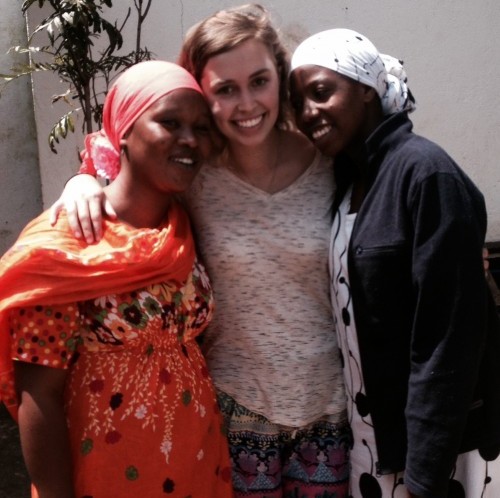(Written by Madison Snelling)
More college students are traveling and volunteering abroad than ever before.
I have volunteered with multiple organizations in multiple countries, seeking a combination of work and travel experience. My desire to see the world and work abroad is by no way unique; my generation, more than any previously, is interested in supporting initiatives that “better the world.”
We are concerned with increasing the welfare of people globally, invested in philanthropic societies and ideals. However, while we are avid supporters of good causes, we hardly ever criticize the programs and organizations that serve them. In an era when we are so focused on development and volunteerism, it is important that we look at the ideologies that are driving certain programs, and the program’s unintended results.
A big push is being made in the development world to implement programs that target women’s financial status.
The generally held belief is that money invested in impoverished women is more likely to be invested back into the family, as women are “instinctively maternal” and will want to improve their family’s well-being.

Sounds good right? These programs seem to be empowering women, and directly focus on families in need of additional income. However, if we investigate the ideologies and theories driving these programs, there are serious weaknesses in the way in which development has been conceptualized and implemented. Maternal altruism is one of the persisting limitations with development ideology and practice particularly in Sub-Saharan Africa.
Maternal altruism, as defined by Richard Schroeder, is the “ideology that stipulates that women are, by virtue of their identities as mothers and wives, ‘naturally’ predisposed toward nurturing and self-sacrifice,” (Schroeder, 9).
Maternal altruism is the driving force behind many women-centered development programs.
The inherent assumption of maternal altruism is that women’s own aspirations are heroically neglected in order to prioritize the needs of their family members.
Further, by characterizing women as a homogeneous group defined by selflessness, “maternal altruism” also erases class, race, or any kind of individuality that may influence women’s motivations to take care of family members or perform traditional work. It is an ideology that encourages the ascription of sameness. The elimination of diversity of body and belief amongst women in developing nations makes all hundreds of millions of them a single uniform group.
Picture an “African woman” in your head. What do you see?
Does she have something balancing on her head? A baby strapped to her back? Is she standing in a field? Holding a bucket of water? All of these images portray a woman defined by maternal altruism. These are the only pictures we see of “African women” in development campaigns. I do not believe these pictures are staged; women do fetch water, they do take care of children, and they do preform agricultural work.
My problem with these images is that development organizations and the public are taking them at face value. No one is asking why. Why are you preforming the agricultural work? Is it really because you only have interest in ensuring that your family has something to eat or is it because it is your ethnic custom? Is it because it is your only source of income?
If it is, would you rather be doing something else? What would that be and what do you need to do it? Many development non-profits invest in women’s agricultural work to better ensure family food stability. While full stomachs are a noble cause, these programs need to be asking if women aspire to do something else.
Women’s development initiatives need to move away from the mindset of maternal altruism and truly empower women by giving them the tools to make their own diverse choices.
When I volunteered at Give a Heart To Africa (GHTA) in Moshi, Tanzania last summer, I worked for an organization that focused on women. GHTA’s school aimed to give local women the tools and skills they need to open their own small business. My students had widely different interests; Mariamu wanted to expand her current business, Esther wanted to open a fabric shop, Tausi wanted to be an English translator, and Faraha wanted to be able to read English books to her kids at night.
Each woman had an invested interest in their family, but also had interests of their own. The diversity of aspiration in one small school shatters the notion of maternal altruism. We would never expect women in the US to universally forgo personal interests for those of the family. We would never categorize US mothers as a homogeneous group.
There are bad mothers, ambitious mothers, childless women who do not fit the idyllic category put forth by the ideology. The fact is, there are bad mothers, ambitious mothers, and childless women in developing nations, so why do we hold them to a different standard?
No group of women is the same.
Why do some development organizations throw the blanket of maternal altruism over all of these women? Because we, as non-profit supporters, volunteers, and fundraisers, allow them to. As consumers on the development market, we can use our “purchasing power” by investing in organizations that have well-constructed programs; programs that do not ascribe homogeneity to their recipients, programs that give people the power to make their own choices.
We, as college students, are the largest group ever to be invested in development initiatives. Whether by volunteering, fundraising, or raising awareness we often support the operations of organizations without truly understanding the ramifications behind their actions.
We receive the benefit of feeling good about contributing to “bettering the world,” and walk away before we witness the aftermath, or look too closely at the labels we place on those receiving a program’s benefits. By turning a critical eye to non-profit organizations and their work, we can influence the way in which future programs are constructed.




